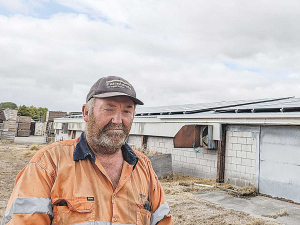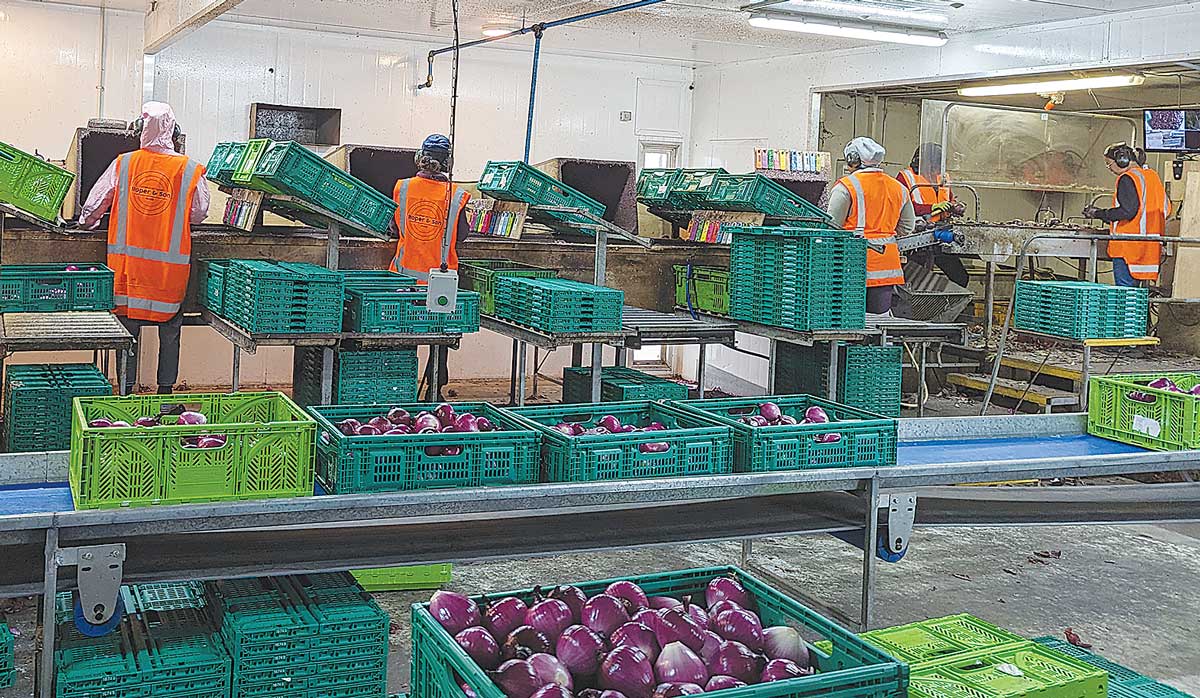Water quality results reinforce need for action
Hundreds of water samples taken from Ōtūwharekai Ashburton Lakes and streams over the past year confirm that water quality remains a concern, according to Environment Canterbury.
 Lincoln vegetable grower Lance Roper with some of the solar panels recently installed atop many of his buildings to power his processing and coolstore plants. Photo Credit: Nigel Malthus
Lincoln vegetable grower Lance Roper with some of the solar panels recently installed atop many of his buildings to power his processing and coolstore plants. Photo Credit: Nigel Malthus
"Why follow when you can lead?" is the motto of Canterbury veggie grower Lance Roper.
Roper takes an innovative approach that has seen him recently install solar panels on the roofs of several of the buildings on his base, just south of Lincoln. When fully commissioned, the 263 solar panels are expected to run the packing line and irrigation system "100% when the sun's out" and will reduce the farm's carbon footprint by 14,000kg a year.
Roper farms 200ha (including 80ha of leased land at Darfield), with peeled red onions his flagship product. They are a popular item on the country's supermarket shelves under his own Roper's Ready To Go brand.
One of New Zealand's largest peeled onion producers, at least for the domestic market, he runs a 300t capacity coolstore. This allows him to store and supply fresh onions throughout the winter.
Roper also grows pumpkins, beetroot, process pea and beans for Watties, maize for dairy support, wheat, barley, grass seed and, in spring, silage grass.
"It's always pretty busy," he told Hort News.
Roper has progressively built up the business after starting with 7ha of leased land at Halswell in 1991. He began in the industry at the age of 17 by working for a market garden in the district.
However, after 12 years the owner encouraged him to lease some land and go into business in his own right.
"Now he's one of our valued contract growers who supply us with onions because we need to diversify our production location in case of a severe weather or biosecurity event," he told Hort News.
"We've got a couple of growers that we work with in the North Island and three in the South Island, plus us."
Roper does three plantings a year of red onions and is currently busy harvesting the 2022 over-wintered crop.
In the off season, he will also import onions from America if necessary to meet supply commitments. It was an unusually large amount last season because domestic production was hit by bad weather both for his Pukekohe suppliers and in Canterbury./p>
“It rained almost every day of January and every second day in February and the onions were just so weak.
“They didn’t cure and didn’t keep.”
This summer, he is lamenting a lack of sunshine.
“The onions took around three weeks to germinate and get going. So, when they’ve taken that long to get out of the ground, they’re not as good a crop at the end,” Roper explains.
“And then we’ve had dull days and a bit too much rain. Change is here. It’s happening and we’ve got to change, right? Today, it’s not a good day. It’s humid and damp. There’ll be mildew pressure today,” he adds.
One of the innovations Roper has put in place to deal with changing conditions is to plant the onions in raised 1.2m wide beds to help keep them warm and guard against wet feet.
The beds are constructed by a machine towed by self-steering GPS-enabled tractors.
Cultivating and planting is done with precision Ag, which he first adopted about eight years ago and he says is progressively getting better.
Massive Changes
The business has changed “massively” in the last 10 years, Roper told Hort News.
For environmental reasons, he has recently installed a pivot to replace an outdated irrigation gun, and planted over 2,000 native plants in three-meter wide buffer strips along the boundaries.
Ducks swim in a small pond surrounded by native plantings which takes the wash water from the processing line and filters it before it reaches the drain.
He has also invested “a lot of money” into strip tilling to minimise soil disturbance, cultivating only 26% of the paddock with some crops.
“The worms aren’t disturbed, you’ve got better retention of organic matter and soil moisture levels, less dust from cultivation and more accurate placement of fertiliser,” he explains.
“We’ve also noticed that weed control with the strip-till system is far superior compared with conventional tillage methods resulting in positive impacts to farm working expenses.”
“You put it on in the evening or early in the morning and it can be absorbed by the plant within six to twelve hours. Where a hard fertiliser could take three or four days. Then it might need irrigation to be activated.”
Moisture probes are installed that send readings straight to his phone, and regular soil and leaf testing tell him precisely what the crops require.
“It’s got to be hi-tech to stay in business really,” he says.
Roper has had some machinery custom-built to his own specification, including an onion planter that injects sub-surface liquid fertiliser as it goes. There is also a device that uses compressed air to chop pumpkins into 10 segments to be wrapped ready for the supermarket.
The onsite coolstore is another inventive solution. Roper took the opportunity to buy a defunct neighbouring chicken farm and converted the chicken sheds with a thick coating of spray foam insulation on the inside. Now sporting the new solar panels, which Roper expects will completely meet their significant power needs. The sheds replace leased coolstore space at Hornby, which Roper says was expensive and entailed a lot of trucking.
They can accommodate up to 300 tonnes of onions, kept at just 3ºC through the winter.
The operation is also a family affair. Roper’s elder son, Lincoln, 22, has completed a Future Leaders course and studied agribusiness and food marketing at his namesake university. He is now working for an accounting firm to hone his business skills before returning to the farm fulltime.
Douglas, 15, is still at school but is happiest working the farm at weekends and has a similar future planned.
 |
|---|
|
The red onion packhouse at Lance Roper's Lincoln vegetable farm where onions are topped and tailed and peeled with high-pressure air jets. Photo Credit: Nigel Malthus. |
The company name is officially “Roper & Son” but some of the produce bins have already been mistakenly stencilled with “Roper & Sons”. It’s only a matter of time.
“I started from leased land and a $1,000 tractor 30 years ago,” says Roper. “It’s been a lot of hard work, a lot of 80 to 100 hour weeks to get here.”
The Challenge of Urban Spread
Roper keeps one eye on the steadily encroaching Lincoln township, where new subdivisions are creeping closer.
While recognising that growth is inevitable, he realises it could bring problems for his operation.
“We’re likely to get complaints about farming, mud on the road, spraying, harvesting at nighttime,” Roper told Hort News.
“We’ve been working with the council and shared our concerns, and perspectives of what could happen in the near future. It’s in their best interest to work out what’s best for the wider area.”
One suggestion he believes would be to ensure buffer zones of lifestylers who have some understanding of rural life, between the commercial farms and the fully urban residential areas.
The country’s 4200 commercial fruit and vegetable growers will vote from May 14 on a new HortNZ levy.
Meat processor Alliance Group is asking farmer shareholders to inject more capital in order to remain a 100% co-operative.
A vet is calling for all animals to be vaccinated against a new strain of leptospirosis (lepto) discovered on New Zealand dairy farms in recent years.
Dairy
Rural banker Rabobank is partnering with Food Rescue Kitchen on a new TV series which airs this weekend that aims to shine a light on the real and growing issues of food waste, food poverty and social isolation in New Zealand.
Telco infrastructure provider Chorus says that it believes all Kiwis – particularly those in the rural areas – need access to high-speed, reliable broadband.

OPINION: The new government has clearly signalled big cuts across the public service.
OPINION: Your canine crusader is not surprised by the recent news that New Zealand plant-based ‘fake meat’ business is in…